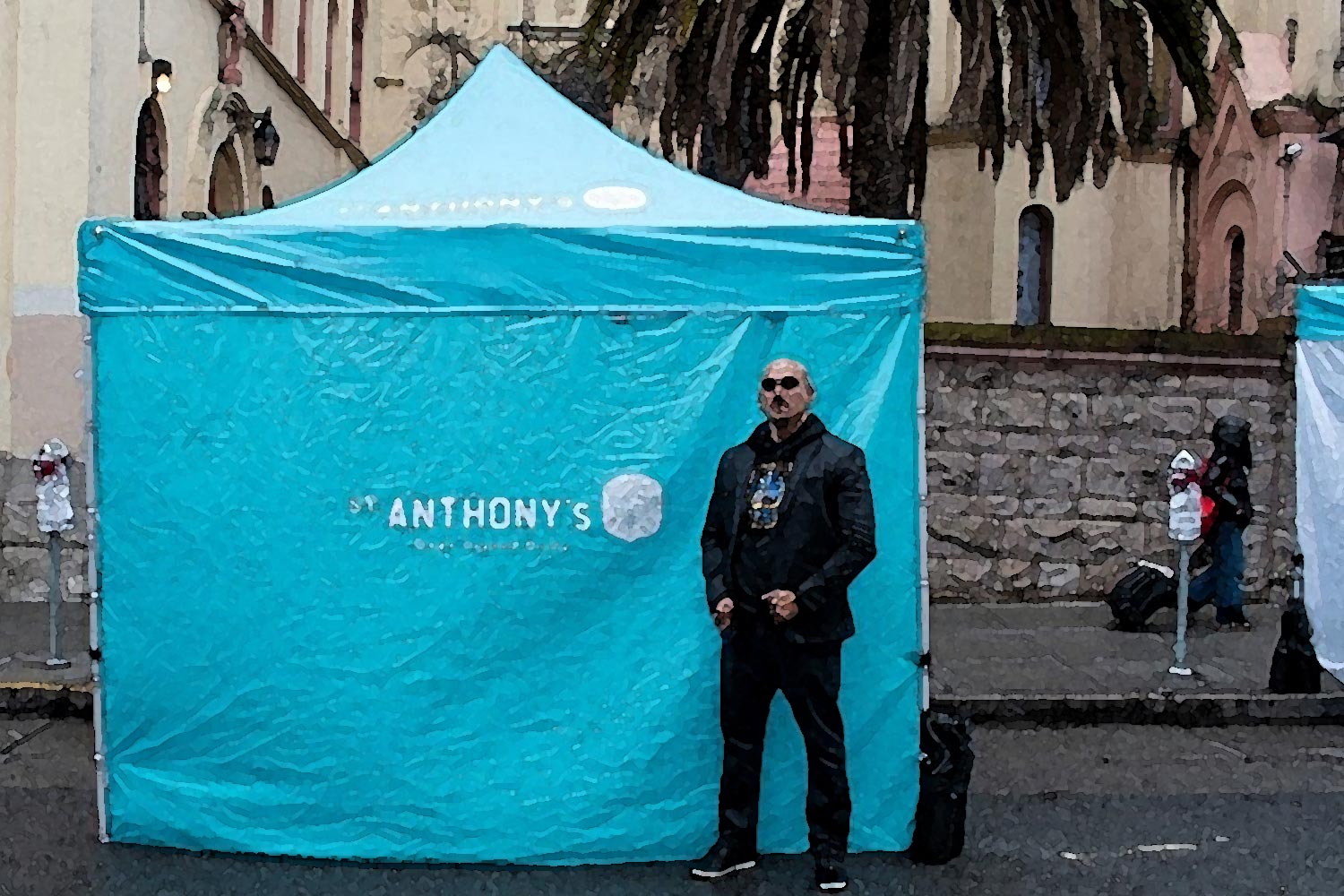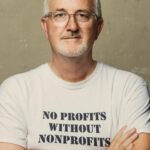Against the Current: Jose “Che” Ramirez
Activist Jose “Che” Ramirez shares some of his ideas about ending homelessness in America and taking on a system bent on holding folks down.

“I recognized a long time ago the power that community, compassion, and simple acts of kindness can have.”
For close to 25 years, I worked in the basement of America’s largest homeless shelter, where we built D.C. Central Kitchen into the model program it is today. But no matter how efficient and impactful we were, we still operated amongst the chaos and complacency that creates homelessness in America. That’s one of the reasons I dig Che so much. I first met him when he was DJing a party, and only later did I learn he was a serious provider, advocate, and ideas man. He’s impatient (which I dig), and he’s willing to risk things by speaking up about the system that seems hellbent on holding folks down. He recently took a big, frontline gig in San Fran, and I wanted to share some of his ideas about ending homelessness in America.
1. What’s your thing? Not what you do, but why you do what you do?
I recognized a long time ago the power that community, compassion, and simple acts of kindness can have on a person’s life. This is as much a personal journey for me as a professional one. As someone who experienced homelessness as a teen growing up, my dedication to serving my community is a reflection of those around me who showed me love and helped me see my own potential. This is how I pay it forward.
2. Ok, now tell us what you do.
I currently serve as the Executive Director for St. Anthony’s Foundation in San Francisco. We have been essential to the Tenderloin community for 70 years, providing an amazing model for service and community. We are truly a one-stop shop for services and programs including hot meals, medical clinic, workforce development, clothing and hygiene, tech lab, resource center, and substance abuse recovery. We are open 365 days a year and have been present throughout the Covid-19 pandemic serving over 3,000 meals a day and innovating new programs and models.
3. As a young leader, what makes you want to scream most about the state of philanthropy? What gives you the most hope for our sector?
Government funding. The applications and reporting are dense and smaller nonprofits get left out of the process many times due to the bureaucracy of funding. All funding is reimbursement-based and smaller nonprofits don’t usually have the cash flow to wait 3-4 months for reimbursement. The funding strategy needs to be restructured.
My peers and youthful leadership give me hope. I’ve been fortunate enough to work alongside some badass young leaders changing the game from the Bay to L.A.. I like to think I’m one of them.
4. If you could get the ear of a presidential candidate, what law or policy would you most urge them to enact, and how would it radically rock your world?
I would actually urge leaders at the national, state, and local level to focus on the systemic issues that contribute to homelessness and poverty. We need to treat housing and access to food and healthcare as a human right. I’d like to see a “right to shelter” policy across the nation where cities are legally obligated to find beds for every person who needs one and to make sure that nonprofits on the ground are funded properly to support cities in leading that process.
5. How much money would you need to truly run wild, and what would it allow you to do?
$100 million sounds like a nice round number. That would allow us to build a 5-year strategic plan to house, heal, and serve our homeless community. We could explore a model that goes from street to hotel to home. We could scale and replicate our modeled programs in other parts of the city where homelessness is now present. I’d also make sure that no senior or student in our community ever experiences homelessness and focus on serving immediate needs and building stronger safety nets. It’s also not just about providing services, it’s about building a sense of community. That is what we do best!
6. Talk about your best elder ally and how they inspired you through their actions.
I’ve been fortunate to have some great mentors in my life. My first opportunity to serve as an Executive Director for St. Francis Center Los Angeles was one of those moments. I had served as the organization’s COO for a few years before the opening came about. I didn’t have previous ED experience: I was only 36 years old at the time, and no leader of color had ever served as ED in the organization’s 45-year history. Tough odds! Nevertheless, the board, consisting of my elders, saw potential in me and gave me a shot. Not only that, but they were some of my greatest mentors in learning the ropes to grow and become the leader I am today.
7. What do you want to be able to say about yourself and your leadership in 20 years?
I’ll be 60! What’s most important is to know that I mentored future leaders and that I changed the game and inspired innovative ways to solve homelessness. Yes, solve homelessness! I think if we focus on 3 things, it can be possible. Let’s focus on reducing the number of people experiencing homelessness, let’s focus on reducing the duration people experience homelessness, and let’s make sure that once people are housed that they don’t go back to being homeless. It is only possible if we as a country, city, and community embrace the crisis as our own and we ALL commit to caring for our most vulnerable. Lead with compassion and the rest will follow. That will be my legacy.
8. Can you tell us what you’re involved with now, during the Covid-19 crisis and innovations you have seen in the field?
We continue to be present 7 days a week for our housed and unhoused communities during this time. We have emerged as a leader in the field at a time when the city’s response to serve our most vulnerable has been slow. We are the innovators in this moment! We installed a conveyor belt in our dining room from the back end to the front for efficiency to serve 3,000+ meals a day. We were the first to advocate for the only full block closure in the city to provide essential services and manage our lines in a safe capacity. We were also one of the first to create our own hotel program covering the cost out-of-pocket for our vulnerable seniors, women and children who did not qualify for the city’s hotel program. This is a model for which we are currently looking to scale and fundraise. Currently only seniors 60 and up or homeless individuals who test positive for Covid-19 qualify for the city’s hotel program. What about everyone else?
9. How has the tech sector in SF been supportive and innovators in this moment of global pandemic?
They haven’t. I mean, at least not anywhere close to the potential I think they have in this moment to make an impact. They ghosted on the community quick! They were the first to send all of their employees home, and that was that. Some have supported with small monetary or in-kind gifts to nonprofits, but most large gifts have been directed to the City’s fund, which none of us nonprofits on the ground ever see.
A few weeks ago, we were the first to bring free outdoor WiFi to our entire 100 block so that our homeless community with phones, which is most of our community, could keep up-to-date with news and updates around the pandemic, especially as many service providers closed or ramped down services. This seems like an area where the tech sector could really step up, bring free WiFi to the entire Tenderloin community. How about we use some of that unused office space to create care centers or feeding operations for those in need? It just exposes the disconnect between the tech sector, who are mostly young professionals, and our SF community. Come out of your bubble and join the fight! This is your community too! We need you! What good is innovation to connect the world if you can’t even connect to your own community in your own backyard?
10. We often frame homelessness as an issue of economics, housing, criminal justice, or mental health… which can be byproducts of racism and economic apartheid in America. We know race plays a role in people falling into homelessness, but what role do you think race plays in our responses to homelessness?
It plays a large role and says a lot! Just look at California and major cities like San Francisco and Los Angeles where a disproportionate number of those experiencing homelessness are Black Americans and Latinos. These are groups that also disproportionately make up positive Covid-19 cases and who also are most likely to be the victims of police brutality. It says a lot about how our government leaders fail to help and prioritize the needs of communities based on who’s affected, who’s suffering, who’s dying!
It is important that major funders recognize the power they have to be a part of the solution by taking a stand in supporting communities of color on social issues that many may see as “controversial.” Homelessness, police brutality, poverty, and public health are all issues in America that are not going away unless we check our privilege and understand our role to play in investing in the lives of those directly affected.
Blue Avocado provides space for the nonprofit sector to express new ideas. The views in this column to do not necessarily express the opinion of the publication or its publisher.
You might also like:
- Is There An Inequality Tipping Point for Nonprofits?
- Using Philanthropy to Address Racial Harm and Inequity
- Beyond the Hype: Why ESG Frameworks Miss the Mark for Small Nonprofits
- How Nonprofits Can Benefit from Embracing ESG Practices
- ESG is Everywhere. Should It Matter to Nonprofits?
You made it to the end! Please share this article!
Let’s help other nonprofit leaders succeed! Consider sharing this article with your friends and colleagues via email or social media.
About the Author
Articles on Blue Avocado do not provide legal representation or legal advice and should not be used as a substitute for advice or legal counsel. Blue Avocado provides space for the nonprofit sector to express new ideas. The opinions and views expressed in this article are solely those of the authors. They do not purport to reflect or imply the opinions or views of Blue Avocado, its publisher, or affiliated organizations. Blue Avocado, its publisher, and affiliated organizations are not liable for website visitors’ use of the content on Blue Avocado nor for visitors’ decisions about using the Blue Avocado website.









This is so inspiring. The one thing I continually see in non-profits serving homeless is possibility. In spite of all the no’s, can’t, requires too much change and other negatives, they innovate and create ways for people to regain dignity and move forward. Everytime I see a new path created my heart warms with promise at what’s possible. The reimbursable model for payment with long wait times has to end. Keep the fight going.
This is so inspiring. The one thing I continually see in non-profits serving homeless is possibility. In spite of all the no’s, can’t, requires too much change and other negatives, they innovate and create ways for people to regain dignity and move forward. Everytime I see a new path created my heart warms with promise at what’s possible. The reimbursable model for payment with long wait times has to end. Keep the fight going.